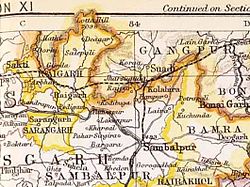Princely state of Raigarh
| Raigarh State रायगढ़ रियासत |
|||||
| Princely State of British India | |||||
|
|||||
|
Flag |
|||||
| Raigarh State in the Imperial Gazetteer of India | |||||
| History | |||||
| • | Established | 1625 | |||
| • | Independence of India | 1947 | |||
| Area | |||||
| • | 1892 | 3,849 km2(1,486 sq mi) | |||
| Population | |||||
| • | 1892 | 128,943 | |||
| Density | 33.5 /km2 (86.8 /sq mi) | ||||
| Raigarh (Princely State) | |||||
Flag
Raigarh was a princely state in India at the time of the British Raj. The state was ruled by a Raj Gond dynasty of Gond clan.
Raigarh estate was founded in 1625. In 1911 Raigarh estate was recognized as a state. The state had an area of 3,848 square km and a population of 174,929 according to the 1901 census. The capital of state was city of Raigarh, which had a population of 6,764 inhabitants in 1901.
The Rajas of Raigarh also owned the Estate of Bargarh and so held the title of Chief of Bargarh. Around 1625, the Raja of Sambalpur, created Daryo Singh as Raja of Raigarh. However, under British, it became a princely state only in 1911, during the reign of Raja Bahadur Bhup Deo Singh.
Among the notable rulers of State were Deonath Singh, who assisted the British in the Mutiny of 1857. Other rulers were Raja Bahadur Bhup Deo Singh,Raja Chakradhar Singh. Chakradhar Singh is noted for his contributions to Kathak and Hindustani music, especially for founding of Raigarh Gharana. The last ruler was Lalit Kumar Singh, his son succeeded him to the throne of Raigarh and ruled briefly before the Raigarh State was merged into Union of India on December 14, 1947. The princely states of Jashpur, Raigarh, Sakti, Sarangarh and Udaipur were united later to form the Raigarh district in present Chhattisgarh.
...
Wikipedia


